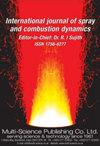Towards a momentum potential theory for reacting flows
IF 2.1
4区 工程技术
Q3 ENGINEERING, MECHANICAL
International Journal of Spray and Combustion Dynamics
Pub Date : 2024-08-23
DOI:10.1177/17568277241268810
引用次数: 0
Abstract
Mutual coupling of (thermofluiddynamic) modes of perturbations can affect the thermo-acoustic stability of combustors and contribute to combustion noise. For example, vortical or entropic perturbations can be transferred to acoustic perturbations if accelerated by the mean flow. The decomposition of perturbation fields into the respective modes and a linear description of their interactions in terms of fluctuating primitive variables is challenging. In contrast, Doak’s momentum potential theory promises an unambiguous decomposition in terms of momentum fluctuations, which is not limited to the linear regime. Whereas classical momentum potential theory takes into account hydrodynamic, acoustic and entropic modes in unconfined flows, the investigation of noise generation in combustion chambers requires the extension of the momentum potential theory to capture modes linked to the fluctuation of species mass fractions (“species mode”) arising from the change in chemical composition due to the reaction. Furthermore, a rigorous treatment of boundary conditions due to the confinement of the flow inside the combustor is required. The herein presented extension to reactive flows consists of two steps, (i) the formulation of a potential for momentum fluctuations related to species modes and (ii) identification of the total fluctuating enthalpy related to species modes. The extended theory is applied to post-process computational fluid dynamic simulation data of the propagation of entropy and species perturbations through one-dimensional ducts, nozzles and premixed flames. We find that although momentum potential theory offers a complete decomposition of momentum perturbations for reactive flows, the meaningful interpretation of this decomposition is rather challenging, even for non-reactive flows.建立反应流的动量势理论
(热流体动力)扰动模式的相互耦合会影响燃烧器的热声稳定性,并导致燃烧噪声。例如,涡动或熵扰动如果被平均流加速,就会转移到声学扰动上。将扰动场分解为相应的模式,并用波动原始变量对其相互作用进行线性描述是一项挑战。与此相反,多克的动量势理论却能根据动量波动进行明确分解,而且不局限于线性机制。经典动量势理论考虑了无约束流动中的流体力学、声学和熵模式,而对燃烧室中噪声产生的研究则需要扩展动量势理论,以捕捉因反应引起的化学成分变化而产生的与物种质量分数波动相关的模式("物种模式")。此外,还需要严格处理由于燃烧器内部气流限制而产生的边界条件。本文提出的反应流扩展包括两个步骤:(i) 制定与物种模式相关的动量波动势;(ii) 确定与物种模式相关的总波动焓。扩展理论被应用于熵和物种扰动通过一维管道、喷嘴和预混合火焰传播的后处理计算流体动力学模拟数据。我们发现,虽然动量势理论为反应流提供了完整的动量扰动分解,但对这一分解进行有意义的解释却相当具有挑战性,即使对于非反应流也是如此。
本文章由计算机程序翻译,如有差异,请以英文原文为准。
求助全文
约1分钟内获得全文
求助全文
来源期刊

International Journal of Spray and Combustion Dynamics
THERMODYNAMICS-ENGINEERING, MECHANICAL
CiteScore
2.20
自引率
12.50%
发文量
21
审稿时长
>12 weeks
期刊介绍:
International Journal of Spray and Combustion Dynamics is a peer-reviewed open access journal on fundamental and applied research in combustion and spray dynamics. Fundamental topics include advances in understanding unsteady combustion, combustion instability and noise, flame-acoustic interaction and its active and passive control, duct acoustics...
 求助内容:
求助内容: 应助结果提醒方式:
应助结果提醒方式:


